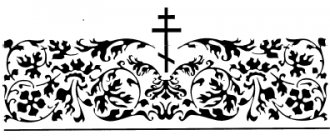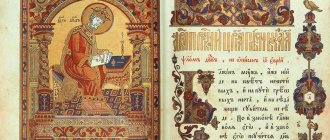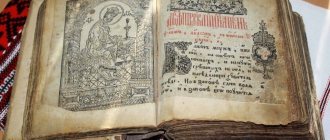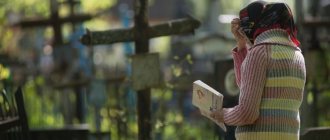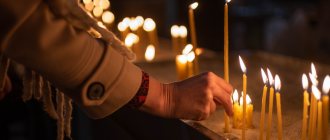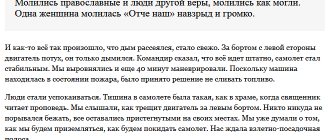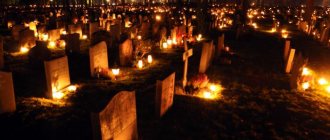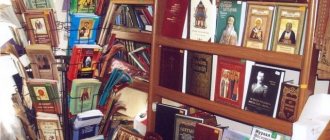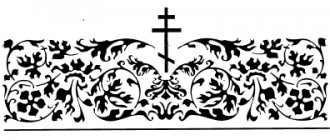Having consigned the body of the deceased to the earth, the Church does not leave his soul without care. The highest and most useful form of intercession for the deceased is considered to be the Holy Liturgy:
There is much help for faithful souls, who give for these to the weak and for their souls, priests and deacons pray and perform services often, i.e. divine liturgy. St. John Chrysostom, lyrics. 76
Pious Christians usually ask to do for the deceased St. Liturgy within 40 days from the date of death (Sorokoust). The basis for this forty-day commemoration is the figurative depiction of the fate of the human soul after death in the church legend about the ordeal. According to this legend, the soul “ascends” to the throne of God within forty days, going through the so-called “ordeals”, where it is tested in its sins, and on the 40th day it appears at the judgment of God.
Undoubtedly, reading the Psalter is a great task for every Christian.
No other book glorifies God as much as the Psalter is beneficial to the soul: it glorifies God together with the angels, and exalts, and sings with a great voice, and imitates the angels, when it casts down demons and drives away, and creates great lamentation and plagues: for kings and princes , and prays to God for the whole world...
John Chrysostom says that a Christian should under no circumstances give up singing psalms:
The sun should not cease from its course rather than abandon the Psalter: for it is great that it is useful...
1 sheet of the Novgorod Psalter - the oldest book of Rus'
What is the Psalter?
The Psalter (Psalter) is a book of the Tanakh and the Old Testament. Consists of 150 or 151 psalms: "songs" or "hymns"
The Psalter is the oldest book of Holy Scripture
It was written long before the coming of Jesus Christ to earth and is the only part of the Old Testament that was fully included in the liturgical charter of the Orthodox Church.
- In the Christian Bible, the Psalter is located after the book of Job and before the book of Proverbs of Solomon.
- The Orthodox Church uses translations based on the Septuagint, that is, the Greek numbering of the psalms.
- The Psalter has a poetic organization , and as a whole, the text can be considered as a poem.
- The Psalter, as an integral book, is characterized by a person’s appeal to God as a personal force, a persistent Observer and Listener, testing the depths of the human heart.
King David playing the psalter.
Photo by Wikimedia Commons. Many of the psalms are believed to have been written by King David . The book also includes prayers from Solomon, Moses , and various ancient Jewish priests revered in Christianity. Since ancient times, the singing of psalms has been accompanied by playing the psaltyrion (a musical instrument similar to a harp).
The Psalter was already read by the first Christians. Even in apostolic times, the psalms were read by heart and used in worship. Today these sacred texts are also used for daily services.
Psalter in Orthodoxy
Psalms are read at every morning and evening service. The Psalter is read in its entirety during the week, and twice as often during Lent.
The Book of Psalms is also included in the prayer rule of the laity . Its value lies in the fact that it shows the path of the human soul in its striving for God, shows prayerful resistance to temptations and sorrows, and gives a high example of glorifying the Almighty.
The Psalter consists of 20 sections called kathismas . Each of them, in turn, is divided into 3 “Glories” (several psalms that are located between the words “glory”). In the services of Vespers, Matins and the Lenten Hours, both entire kathismas and individual verses are read.
Psalms and its meaning
The Book of Psalms belongs to prayer poetry and includes 150 psalms. The Psalms describe various events of the Old Testament, and its authors were King David, Abraham, Moses, Melchizedek and others.
The Psalms can be read both at services and at home. They are also read at funeral services, liturgies, and various services.
Important!
The Holy Resurrection of Christ in 2022 will be on April 19, and St. Thomas Week will be on April 26.
As Gregory of Nyssa says, the psalms are a “guiding hand” for a person who is at a loss, giving peace to the sick. Men and women learn wisdom from them, and for children, reading psalms is fun and joy.
Athanasius the Great claims that reading the psalms leads to repentance, gratitude to God, will relieve sorrow and temptation, and will prompt the answer to any life question.
Constantly reading psalms makes a person spiritually closer to God, he can cope with any troubles that arise in his life.
How to read the psalter at home?
Light a symbolic candle!
It's burning while you're reading. For the laity, the general rules for reading psalms are similar to liturgical ones. Priests give the following advice for those who are just beginning to master home prayers and do not know how to read the Psalter correctly:
- When reading the psalms, it is recommended to light a candle or lamp at home . But the absence of these attributes is not considered a sin. The main thing here is to properly set yourself up for prayer.
- For those who are new to the book of Psalms, you can start reading it in Russian . In the future, as one develops spiritually, one should switch to the Church Slavonic language , in which services are conducted in churches.
- At the same time, it would not be amiss to study the interpretations of the psalms by the holy fathers . This will help you understand the history and meaning of prayers.
- The Church recommends reading the Psalter every day, just like the Gospel . Having finished reading a book, it is recommended to start it again, and so on throughout your life.
- During prayer, sometimes you will have to be distracted by household chores. There is nothing wrong with this, but it is better to devote time to prayers, free from routine affairs .
- At the beginning of each collection there are initial prayers with which to begin reading the Psalter. If you had to stop and continue reading the next day, there is no need to say the opening prayers again . Having completed the entire book, you need to read the prayers that are indicated for reading at the end of the psalms.
- The order of reading the Psalter can be any. But it is best to go from beginning to end, without missing a single kathisma.
- There is no need to read the names of the psalms.
- You can read while sitting. It is necessary to get up only when reading the initial and final prayers, as well as during the “Glories”.
- St. Seraphim of Sarov and St. Ignatius advised reading the book of Psalms in a whisper or in a low voice, but not silently . It is believed that this promotes better perception of prayers and helps maintain attention.
- It is not so much the order of reading that matters, but rather the correct pronunciation . Particular attention should be paid to the stresses in words, since their incorrect placement can distort the meaning of the prayer. You need to read in a slightly chanting manner, monotonously, without showing emotion . The Church believes that theatricality and affectation seduce a person and contribute to his falling into sin.
Scheme of reading the Psalter for the deceased until the fortieth day (Sorokoust)
Semipoklonny began. The publican’s prayer “God, merciful...” ( 3 bows to the waist, if several people are praying, then these bows are made only by the eldest, namely the one who prays ).
Chant to Jesus: “For the prayers of our holy fathers, Lord Jesus Christ, Son of God, have mercy on me, a sinner (us), Amen” ( bow to the waist ).
Trisagion, and Our Father. “Lord, have mercy” ( 12 times ).
Glory, even now. “Come, let us bow...” ( 3 bows from the waist ).
Psalm 90 “Alive and in the help of the Most High...”
Glory, even now. “Alleluia...” ( three times, with bows to the waist ).
“Lord, have mercy” ( three times ).
Then the troparion is read, tone 8, “Through the depths of wisdom...”
Glory, even now. Theotokos “You are the city and refuge of the imams...”
Psalm 50 “Have mercy on me, O God...”
“Come, let us bow...” ( three times, with bows to the waist )
Then all 20 kathismas of the Psalter are read, before each kathisma they read “Come, let us bow...” ( three times, with bows to the waist ). In each kathisma there are three “Glories” (“Glory to the Father and the Son and the Holy Spirit, now and ever and forever, Amen”), and for each “Glory” “Alleluia ...” is read (three times, with bows to the waist ), then the troparion is read for the deceased three times with bows: “Rest, Lord, the soul of His departed servant (s) ( name of rivers ), ( bow ). And the tree in this life is like a man who has sinned. You, as a lover of mankind, God forgive him (yu) and have mercy ( bow ). Deliver us from eternal torment ( bow ). bow ) to the communicant (tsu) of the Heavenly Kingdom . And do something useful ( bow ) to our souls.”
How to read the Psalter for the deceased?
Orthodox traditions
- There is a tradition of reading the Psalter over the body of the deceased until his burial, as well as one kathisma within 40 days after death . This must be done continuously until the funeral.
- Relatives of the deceased should read the Psalter night and day without stopping , with the exception of moments when litias or memorial services are performed at the grave.
- Today, reading over the body is almost impossible, but you can divide the day into several segments and distribute time between relatives to read a book at home .
Week after Easter
The week after Easter is one of the joyful weeks of the year (along with Christmas). After all, Jesus Christ was resurrected, he conquered death.
Important!
During Bright Week there is no need to read the prayer of Ephraim the Syrian.
During this period, joyful and pious services are performed in churches. And the Orthodox Christian asks the question: when do they begin to read the Psalter after Easter? You can start reading psalms on St. Thomas Week.
The name of the first week after Easter is named after the Apostle Thomas, who was popularly nicknamed “the unbeliever.” The story goes that the apostles were persecuted by the authorities after the death of Jesus, so they did not leave the house. Christ appeared to them in a new hypostasis, as the Risen One. All the disciples believed it. But Thomas was not among them.
Important!
On the days of Bright Week, kathismas are not read.
When the companions of the Christian faith found him and told him about the miraculous resurrection of Jesus, he did not believe it and wanted proof (to touch the wounds on the body of Christ with his hand). On the first resurrection after Easter, the Son of God appeared to the apostles, and when Thomas touched his wounds, when he heard the words that he himself uttered, he believed in the Power of Christ.
Apostle Thomas is a collective image of a person who needs not only blind faith, but also facts.
Thomas Resurrection is also called Antipascha. Don't be afraid of this word. The prefix "anti" does not mean "against", but "instead of". The essence of this day is to repeat to everyone that Christ is Risen! This true idea was celebrated for seven days. After the festive service, the Royal Doors are closed, and the priests begin to read psalms, kathisma and polyeleos.
Therefore, the information about whether it is possible to read the Psalter on Bright Week is correct and unambiguous. The Church allows this.
When should you not read the Psalter?
There are no prohibitions on reading the book of Psalms. But if a lay person takes a vow or any permanent prayer rule, then it is necessary to take a blessing from his confessor . The priest must assess the life situation of the believer and the degree of his spiritual development. It happens that a person wants to take on an unbearable burden , which can cause problems. In such cases, the priest may refuse to bless the reading.
There is a time when the Psalter cannot be read not only by the laity, but also by church ministers . It begins on Maundy Thursday of Holy Week until St. Thomas Week . During these ten days, the book of Psalms is not read either in churches or in private.
You cannot read prayers for health and peace at the same time , but this can be done at different “Glories” within the same kathisma. For example.
- At the first “Glory” you can pray for the health of the Patriarch, the bishop, your confessor.
- The second one is about the health of family and friends.
- On the third - about repose (you need to start with the deceased Patriarchs, and end with deceased relatives and friends).
We recommend:
- Funerals and memorial days
- 40 days after death: the essence and rules of rituals.
- Obituaries and memorial pages for the deceased
How to learn to understand the psalms?
A popular question that concerns many believers: how to understand the Psalter, especially if you read it in Church Slavonic? Usually the answers of priests and theologians are somewhat different.
- Someone advises to still read the Psalter for the dead and about health, even if you don’t understand. The main argument: you don’t understand, but the evil spirits understand everything and run away. Over time, the one who prays earnestly will also begin to understand. God reveals.
- Others recommend using translations into Russian, writing out individual words, and using a dictionary from Church Slavonic to translate them into Russian. It is best to read historical information about the writing of each hymn and use the interpretations of the holy fathers and theologians.
You can find such explanations both in the church store and on useful Christian sites. Also, in order to understand the meaning of the hymns, one must study the Holy Scriptures. What David experienced before he wrote Psalm 50 is described in the Second Book of Samuel.
Priest Konstantin Parkhomenko gives recommendations for those who want to read the Psalter for the Dead:

